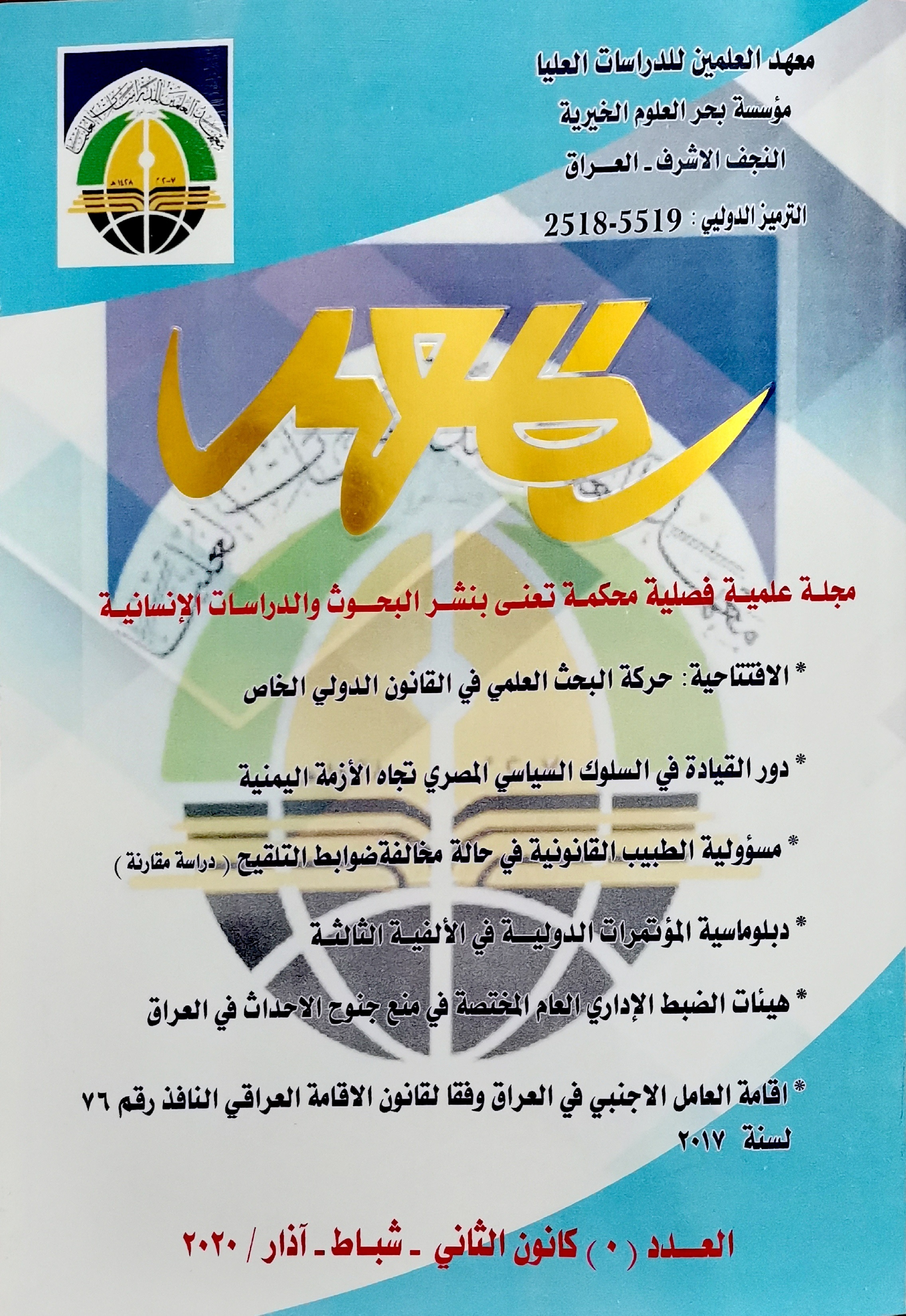دور القيادة في السلوك السياسي المصري تجاه الأزمة اليمنية
DOI:
https://doi.org/10.61353/ma.0000067Keywords:
القيادة, السلوك السياسي, السياسية الخارجية, الازمة اليمنيةAbstract
اضحى مفهوم القيادة من المتغيرات المهمة في مجال السياسة، وما يتبعها من استراتيجيات سواء تعلق ذلك بمؤسسات الدولة وتعاملها مع متغيرات بيئتها الداخلية والخارجية، أم ما يتعلق بالدولة نفسها وطرق تعاملها مع المتغيرات الداخلية والخارجية.
فضلاً عن ذلك يحتكم السلوك الخارجي للدولة بالقيادة السياسية في النظام الدولي، اذ ان السياسة الخارجية تأتي نتيجة لتفاعلاتها على مستويات التحليل الثلاث في حقل السياسة الدولية (نظرية كينيث والتز)، فهناك المستوى الأول: وهو مستوى الافراد (النخبة والقادة ورجال الدولة) والمستوى الثاني هو مستوى الدولة (بنية النظام السياسي والاجتماعي المحلي، ومؤسسات الدولة، والتركيبة الاجتماعية... وغيرها)، واخيراً المستوى الثالث، وهو مستوى النظام (بنية النظام الدولي، وعدد الاقطاب المسيطرة على النظام، وتوزيع القدرات فيما بينها، والمقيدات والضغوط التي يفرضها الهيكل الدولي، والفرص التي يتيحها)، اذ يتم تشكيل سلوك الدولة الخارجي بناءً على نوعية التعامل وكيفية استجابة الدولة لهذه التفاعلات.
وبعد العام 2011 احتكمت السياسة الخارجية المصرية بالمستوى والاول والثاني المشار اليه اعلاه في سياستها الخارجية، اذ ان القيادة السياسية المصرية انتهجت مسار تنويع الخيارات وفتح آفاق جديدة امام صانع القرار المصري، وهذا ما عكسته التحركات المتتالية للقادة المصريين في المضمار الخارجي، ويعد هذا التنوع والتوسع الذي تشهده حركة السياسة الخارجية المصرية امراً ايجابياً خصوصاً اذا ما لاحظنا تصاعد التحديات والتهديدات التي تواجه دول العالم بصفة عامة، ومنطقة الشرق الاوسط بصفة خاصة، من تفاقم الموجات الارهابية وتصاعد حدة الانقسامات السياسية والعرقية والمذهبية، مما انذر معه بحالة غير مسبوقة من تراجع قدرة الدولة القومية، ودخولها في احتمالات التفكك والتشرذم الى وحدات صغيرة.
The concept of leadership has become one of the important variables in the field of politics, and the subsequent strategies, whether related to state institutions and dealing with the variables of its internal and external environment, or with regard to the state itself and ways of dealing with internal and external variables.
Moreover, the external behavior of the state is governed by political leadership in the international system. Foreign policy is the result of its interactions at the three levels of analysis in the field of international politics (Kenneth Waltz theory). There is the first level: the level of individuals (elite, leaders and statesmen). The level of the state (the structure of the local political and social system, the institutions of the state, the social structure, etc.) and finally the third level, the level of the system (the structure of the international system, the number of poles controlling the system, the distribution of capacity among them, and the constraints and pressures imposed by the national structure). International, and opportunities), since the formation of the external behavior of the state based on the quality and how to handle the state's response to these interactions.
After 2011, the Egyptian foreign policy has adopted the first, second and second level mentioned above in its foreign policy. The Egyptian political leadership pursued the path of diversifying options and opening new horizons for the Egyptian decision-maker. This is reflected in the successive movements of Egyptian leaders in the external arena. The Egyptian foreign policy movement is witnessing a positive situation, especially if we note the escalation of the challenges and threats facing the countries of the world in general, and the Middle East in particular, from the exacerbation of terrorist waves and the escalation of political and ethnic divisions. Endodontic, which warned him of the status of an unprecedented decline in the ability of the nation-state, and its entry in the probability of disintegration and fragmentation into small units.
Downloads
Published
Issue
Section
License

This work is licensed under a Creative Commons Attribution-NonCommercial-NoDerivatives 4.0 International License.







